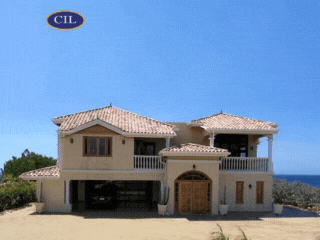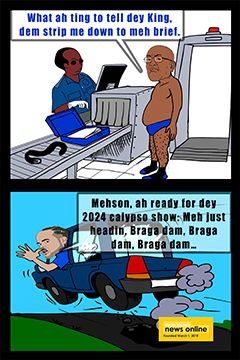Hurricane Irma & the dearth of national planning
The economics of disaster stresses the importance of strategic planning for a country.
OK. Post Irma has been mantra filled. BVI Strong, Build Stronger and Better, are two that struck this Writer.
Now, for 15 years, this Old Boy, and fellow Economics Commentator Edgar Leonard, have been singing the song of strategic economic planning, in thousands of words of commentary, on hundreds of pages of narrative in Virgin Islands News Media.
However, these seeds fell on infertile soil. There was never germination. Why? because the Virgin Islands possesses a reactionary sub culture. This reactionary subset, an anachronistic parochialism, even fatalism, is embedded deep in the national DNA, or psyche. It derives from the natural insularity of islanders, and a history of religion, even slavery.
Yes: there are numerous forums. There are radio and TV shows; excellent print newspapers, aggressive and lively online threads; and now ubiquitous social media; and a new beast called WhatsApp.
OK. This is a society that loves to chat. The country is in love with the forum. This is actually very healthy for democracy, and good governance.
However, the problem is this: forums in the Virgin Islands are for simple entertainment. There is never any real attempt to take ideas and solutions offered by the chattering classes seriously. Not until, there is accident, or disaster. Then all of a sudden, years of media assertions are repeated non-stop by society’s movers and shakers: the supposed elite class. However, when matters come to the attention of the ‘elite class’ it is frequently too late.
Now, a critical concept of economics is Opportunity Cost. Opportunity Cost asserts that resources are scarce. Consequently, if I spend X on Y, then I have to sacrifice M: go without M so to speak. I only buy both Y and M if I have the resources. For most consumers, apart from the rich, there must be a choice made in spending decisions.
For every buying decision, there is something else I have to sacrifice. In order to have tea and biscuits at home every afternoon, I may have to do without hot chocolate and fudge; my personal favourites.
Opportunity Cost involves millions of spending decisions consumers make each day. Governments and organisations too, make these spending decisions. The Purchasing Manager must decide between buying this or that product or raw material. He or she has to decide the best way to go in the buying metric, in order to help the business’s bottom line.
Therefore, wise spending decisions require careful thought. If a country wants to spend 300 million dollars on an airport, then it has to give up something in order to fulfil that national dream. Not unless the country is one of those super states that create cash out of thin air.
Opportunity Cost is decided by GDP. A country’s GDP is limited, and decided by specific metrics, add simple prudence. Most countries cannot build that airport and multimillion dollar dock simultaneously. Countries, like individuals, must live within means. As some sage stated once: there is no free lunch.
The problem with the Virgin Islands is that for 30 years there has been no real thought given to opportunity cost in economic development. And like most developing countries, strategic resource planning has been placed on the back burner. Spending decisions in developing countries tend towards the political, not economic.
Then, there is not simply a dearth in planning, but the prerequisites for effective planning, such as accurate statistics, demographics, and the comprehensive and chronological archiving and documentation of historical and critical data is lacking.
Strategic planning is about opportunity cost and priority, and under the economic models this "Economist" loves to expound- Stimulus and Austerity- economic planning is at the apex of national decision making.
In a geographically vulnerable region, building resilient, tough, and robust roads, with effective drainage, run off, and environmentally friendly design; ensuring that rain water running from the top of hills is engineered and optimally channelled through the coastal plain into the sea; ensuring the widest possible distribution of potable water from frequent rainfall; placing critical telecommunications, and power infrastructure underground; are a few examples of vital spending and planning priorities. These come first, before building that airport or ‘Coney Island.’
These things must come first. Irma exposed the vulnerability of not putting critical infrastructure underground, and ensuring that critical government departments were housed in bunker type buildings owned and managed by the state.
The result was that the disaster was more severe than if more thought out resiliencies were built into the national physical infrastructure, in the first place.
The Virgin Islands must adopt innovative strategic economic planning as the critical element in the march towards a truly prosperous and developed future. This will entail drawing up 5, 10, 15, 20 years, linked, strategic development plans. A long term strategic development plan for the territory must be well thought out, built into law, and fully transparent and accountable to Joe Public.
The national economic plan must be based upon a national vision of a free and fully developed Virgin Islands, widely acceptable to most residents, not a small well connected cross section.
Post Irma, the country remains a developing country, and has gone backwards ten years in terms of its social and economic development. That backwards march was not simply the fault of Irma. The Irma tragedy, and the storms of September 2017, exposed the hidden economic and social vulnerabilities of the Virgin Islands.
Connect with Dickson Igwe on Facebook and Twitter










.png)




.png)



.png)






















5 Responses to “Hurricane Irma & the dearth of national planning”
The funding for the recovery effort has to be borrowed. But a strategic plan, along with tactical and action plans, is vital to gaining lenders approval for the $B that is needed for the recovery. Due to prior poor planning performance (finance), lenders terms and conditions will be stricter for acquiring loans. Futher, the UK as co-signer for the loans will add its requirements and processes for aquiring and expensing loans. Plan the work and work the plan.